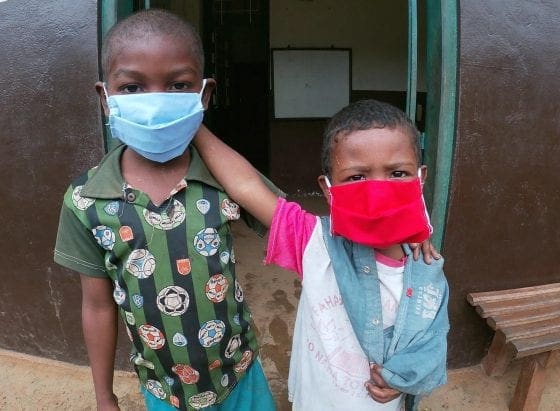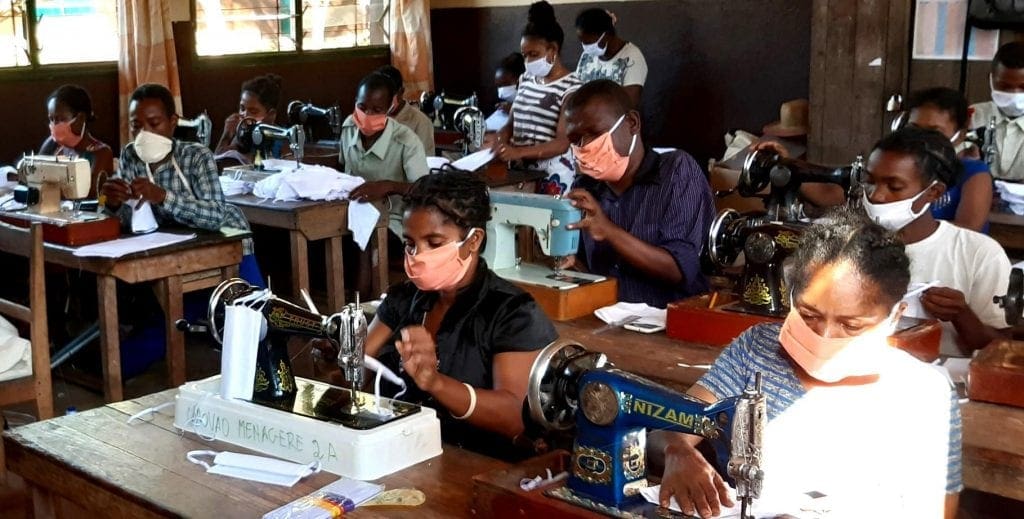
Dear relatives and friends, the global coronavirus pandemic has for several months seriously disrupted the life of the whole world, yours, and ours. It reached Madagascar on March 19 and it also paralyzed the life of the country. As in France, we are moving towards progressive opening up from quarantine. However, infected areas remain active and are of concern for the future. I am sending you this exceptional Pirogue (the next should normally have appeared in September) to give you our news. We in Tanjomoha are all in good health, and we thank the Lord for it. But our daily lives were significantly disrupted and our activity was intense, as I will explain to you. This “Big Island” was affected by the global health crisis but also by what I would call its “collateral damage,” which has been serious. There has been more poverty, particularly due to restrictions on circulation, and also more diseases. Our dispensary received very poor patients in large numbers. We had to treat them free of charge and this has resulted insignificant additional expenses. Even more, due to school closings, we received fewer tuition fees from students in our St Paul and St Luke schools and from ESIGAT. Even if they are modest, they ultimately represent an important amount. The shortfall was clear, but we had to pay the teachers to keep on going.
I will also tell you how we are concretely engaged in disease prevention. Donations for Tanjomoha at the start of the year fell sharply. In fact, I was concerned that credits on our account at the Mission Service in Paris had fallen by 75% compared to previous years at the same time. In fact, it was due to confinement or quarantine, when everyone was blocked at home. But with deconfinement, the donations have resumed and I thank you very much. However, we have not yet reached the amounts from previous years. And that’s why I appeal to your generosity, especially more since our spending has been higher, especially for health and education.
We were able to follow each day, on the Internet, the progression of the pandemic in France and the whole world. This grave danger that has hovered over the world, with the grueling confinement that has ensued, has profoundly changed your daily life. There were probably sick people among you and we hope they are well recovered. There may have been deaths among your loved ones. Many died alone in hospitals or in nursing homes, without families being able to visit them or view them after death. Burials were done in the strictest of privacy. This was a great ordeal for many families. Rest assured that we think a lot about you and that we pray for you. We hope that we are now at the end of the tunnel.
The situation on the island
Covid 19 arrived in Madagascar in mid-March, in Antananarivo, by a plane coming from France with three positive cases on board as the Madagascan President, Mr. Andry Rajoelina announced. The sick and those suspected of illness were immediately quarantined. The President proclaimed “A state of health emergency” throughout the national territory, renewed every two weeks to limit the spread of the virus. This meant in particular:
• A ban on all gatherings, resulting in the closure of schools and churches.
• A ban on traffic, with the closure of airports and major highways.
• The obligation to wear a mask in public.
Some cities were in a state of containment, like Antananarivo, Fianarantsoa and Tamatave, at least theoretically, because it was nearly impossible to channel the mass of very poor people, without employment, who have to go out to find some way for daily survival.
The President proclaimed “A state of health emergency” throughout the national territory.
The government allowed the graduation classes to return to school in the morning, through the wearing of a mask, and respecting a distance of one meter between students
The situation in the region of Vohipeno
No positive case has been detected so far: there have only been three suspect cases, all declared negative after testing. We have not been subject to total confinement, but only to the traffic ban 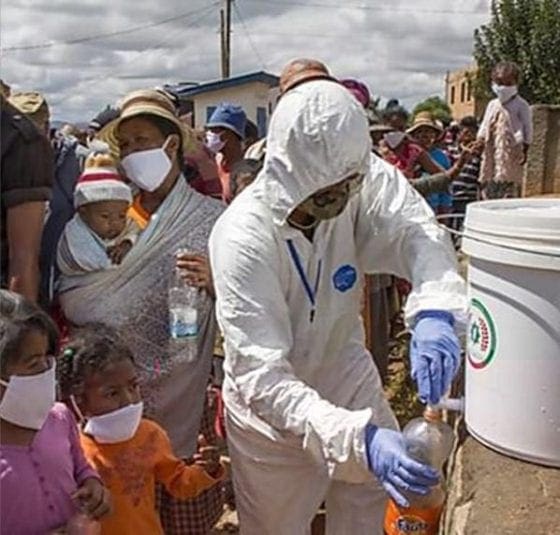 between big cities and gatherings, as well as with the obligation of wearing a mask. This meant the immediate closure of schools and churches. So we immediately closed all our centers and sent our boarders home, before the roads were blocked. But all the sick remained. Our dispensary even experienced an increase in attendance; and all our care centers – for tuberculosis patients, the mentally ill, malnourished children, and poor patients – functioned normally.
between big cities and gatherings, as well as with the obligation of wearing a mask. This meant the immediate closure of schools and churches. So we immediately closed all our centers and sent our boarders home, before the roads were blocked. But all the sick remained. Our dispensary even experienced an increase in attendance; and all our care centers – for tuberculosis patients, the mentally ill, malnourished children, and poor patients – functioned normally.
We had to interrupt the celebrations in our Tanjomoha church and we celebrated mass in small groups in the private chapel of the Sisters for 5 to 6 weeks, even at Easter (!). Our overseas volunteers were delighted because the mass was … in French.
But as of mid-April, the government authorized the graduating classes (7th, 3rd, and terminal) to resume classes in the morning, subject to the wearing a mask, respecting a distance of one meter between students and washing their hands with soap before entering the classroom. Here in Tanjomoha, we immediately called back our affected students, including those of 3rd year of sewing and carpentry schools, as well as ESIGAT 2nd year students (IT and management).
Likewise, places of worship were allowed to reopen their doors to the faithful respecting the same conditions as for the pupils in the schools. We then moved to two masses on Sunday in Tanjomoha to respect the one meter of regulatory distance.
Tanjomoha is committed to prevention by making more than 65,500 masks
We called 25 dressmakers and seamstresses from Vohipeno, almost all disabled, and trained in our Tanjomoha sewing school.
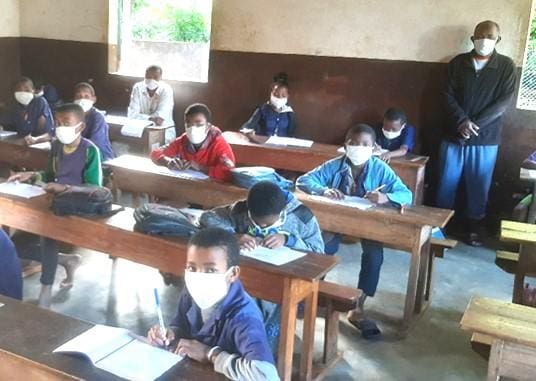 A main preventive measure, decided by the government, has been to make it mandatory to wear a mask in public places. It was certainly a wise move to limit the spread of the disease. But there were few masks available in the country and, besides, it was expensive for the poor who constitute the vast majority. That is why, when I learned about the project “500,000 masks for Madagascar,” launched by our friend, Dr. Bruno Buttinof the AMM (Alliance et Missions Médicales), which aimed to subsidize the making of masks in large numbers in Madagascar to distribute for free to the people, I asked to join in this great initiative.The AMM, through Mr. Luc Ronssin, director of “Relais” (Housing) at Fianarantsoa, provided us with free materials (fabrics, elastics, sewing thread), and we held a fundraiser, sponsored the Association France-Tanjomoha, to finance the wages of the dressmakers. We made a first batch of 30,900 masks in using 25 Vohipeno seamstresses, almost all being disabled people, trained in our sewing school of Tanjomoha. And two weeks later, we launched a second batch almost equivalent, which made a total of 60,844 masks made in Tanjomoha and quickly distributed, free of charge. We are now about to launch a 3rd batch, 4,700 masks, to respond to a request from Mananjara, a small coastal town 150 km north of Vohipeno. This will make a grand total of more than 65,500 masks produced here. Our dressmakers were delighted with this operation, because they were making good wages when we were in a period of “fasting” (that is, while waiting for the rice harvest people have little food and little money) when it is more difficult to find work sewing. In addition we served them a good meal for lunch and our car went to pick up and drive back those who live in the city.
A main preventive measure, decided by the government, has been to make it mandatory to wear a mask in public places. It was certainly a wise move to limit the spread of the disease. But there were few masks available in the country and, besides, it was expensive for the poor who constitute the vast majority. That is why, when I learned about the project “500,000 masks for Madagascar,” launched by our friend, Dr. Bruno Buttinof the AMM (Alliance et Missions Médicales), which aimed to subsidize the making of masks in large numbers in Madagascar to distribute for free to the people, I asked to join in this great initiative.The AMM, through Mr. Luc Ronssin, director of “Relais” (Housing) at Fianarantsoa, provided us with free materials (fabrics, elastics, sewing thread), and we held a fundraiser, sponsored the Association France-Tanjomoha, to finance the wages of the dressmakers. We made a first batch of 30,900 masks in using 25 Vohipeno seamstresses, almost all being disabled people, trained in our sewing school of Tanjomoha. And two weeks later, we launched a second batch almost equivalent, which made a total of 60,844 masks made in Tanjomoha and quickly distributed, free of charge. We are now about to launch a 3rd batch, 4,700 masks, to respond to a request from Mananjara, a small coastal town 150 km north of Vohipeno. This will make a grand total of more than 65,500 masks produced here. Our dressmakers were delighted with this operation, because they were making good wages when we were in a period of “fasting” (that is, while waiting for the rice harvest people have little food and little money) when it is more difficult to find work sewing. In addition we served them a good meal for lunch and our car went to pick up and drive back those who live in the city.
To whom where the masks distributed?
In public and private schools in the region, through public organizations (the rectorate of the academy) and private (DIDEC for Catholic education).
• In public and private health centers, via the District Medical Inspector • To the police, gendarmes and administrative staff, including the District Manager.
• In the Catholic and Protestant churches of the region, without distinction, for the sake of ecumenism.
• For the needs of the communes, by the District Manager and the mayors, as well as at the prison of Manakara.
And, of course, we have provided for all the internal needs of the Tanjomoha Home.
The masks were leaving almost as fast as they were made, so large was the demand. We hope that this has helped to limit the spread of the disease.
“The collateral damage” of Covid 19
Since mid-March, all the attention of the authorities has been focused on the fight against the coronavirus which posed a serious threat to public health. But suddenly USAID, which had distributed 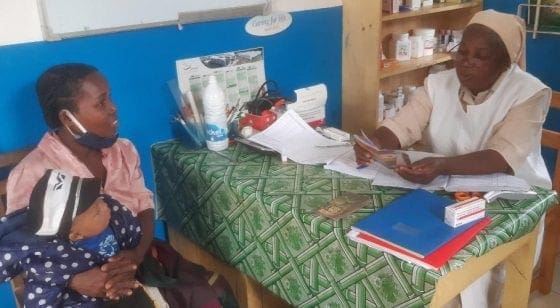 for free ACT, the main malaria drug, stopped doing so to subsidize the fight against Covid 19. As a result, ACT quickly ran out in all health centers, pharmacies and even central pharmaceutical purchasing. We have been reduced to resorting to quinine which is an outdated medicine with many side effects, sometimes serious, and which also ran out. We then used a drug indicated for the simple prevention against malaria in pregnant women… The drugs, although inadequate, had become subject to charge, while ACT was free before. And to make matters worse, we did not even found more mosquito nets for sale throughout the region. Consequently, as it was very hot and humid, cases of malaria were especially numerous … and the dead, as well. March to mid-May is the annual “fasting” season when poverty is more acute.
for free ACT, the main malaria drug, stopped doing so to subsidize the fight against Covid 19. As a result, ACT quickly ran out in all health centers, pharmacies and even central pharmaceutical purchasing. We have been reduced to resorting to quinine which is an outdated medicine with many side effects, sometimes serious, and which also ran out. We then used a drug indicated for the simple prevention against malaria in pregnant women… The drugs, although inadequate, had become subject to charge, while ACT was free before. And to make matters worse, we did not even found more mosquito nets for sale throughout the region. Consequently, as it was very hot and humid, cases of malaria were especially numerous … and the dead, as well. March to mid-May is the annual “fasting” season when poverty is more acute.
The misery has been especially great this year, such that that we have seen arriving in our dispensary long lines of patients, sick with malaria or other illnesses whom we have had to welcome for free and look after as best we could by buying at great cost large quantities of drugs. Luckily for us, Mrs. Rose Bruchet, stranded in Tanjomoha and failing to find a plane to return to France, has usefully strengthened our overloaded dispensary. In fact malaria has proven to be an even more deadly disease than the Coronavirus. I was recently reading on a website that deaths from malaria in Africa would increase this year from 500,000 to 700,000. This is what I call “collateral damage” Coronavirus.
Furthermore, as many poor people could no longer go freely to the Vohipeno market to sell and buy, and thus find a little money for the day, we saw their misery grow. And lines of poor people lay down at our door asking for help that we could not refuse them.
Resurgence of deaths … malaria, large influx to our dispensary and poverty
Where are we with Coronavirus now?
Official balance sheet as of June 22, 2020
The figures are to be taken with caution, as they may be underestimated, as in many countries by the way. There have been 1,596 confirmed cases since the beginning of the epidemic, with a tendency to rise this last week (+ 300 cases). 929 patients are in treatment, 9 of whom are in serious condition. There have been approximately 18,000 PCR tests performed.
There would have been only 14 deaths in total, due to Covid 19, including 3 during the last week. This figure is probably underestimated because it does not count those who died without having been admitted to a hospital. But after all, the epidemic is still modest here compared to what it is in many other countries. However, there are still very active localized homes that are even on the upswing this past week.
Progressive deconfinement
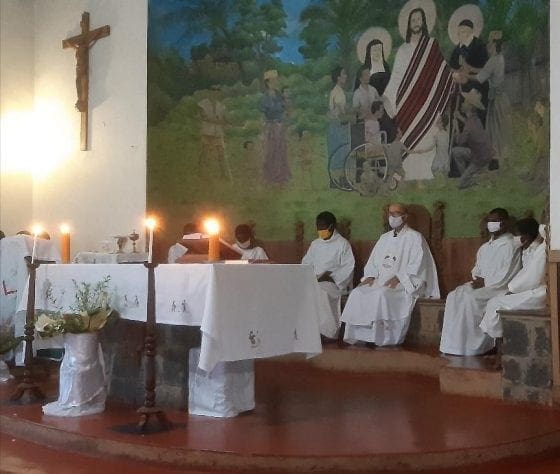 Because the disease remains limited to certain regions of the country, the majority are spared. President Rajoelina announced June 14 that the epidemic was now under control, emphasizing that we are at it remained in stage I (localized areas), and that we can begin a progressive deconfinement in the country, except in places where the virus is still rampant, that is to say the regions of Antananarivo and Tamatave. It is therefore a large part of the Malagasy territory which can gradually resume a normal course of life.
Because the disease remains limited to certain regions of the country, the majority are spared. President Rajoelina announced June 14 that the epidemic was now under control, emphasizing that we are at it remained in stage I (localized areas), and that we can begin a progressive deconfinement in the country, except in places where the virus is still rampant, that is to say the regions of Antananarivo and Tamatave. It is therefore a large part of the Malagasy territory which can gradually resume a normal course of life.
The Vohipeno district can also go into progressive deconfinement, while respecting the safety rules in force, in particular wearing a mask. Our schools host their students part-time , and they are happy to resume classes.
In conclusion
We hope that the worst is behind us, both in France and in Madagascar, and around the world, and that soon this sad episode of Covid 19 will be overcome. However, WHO is not optimistic and announces a likely resumption of the global pandemic in the coming months. The future will tell. Let’s be careful.
I greet you all cordially, dear parents and friends, in wishing you good health and also being able to take some vacation and real rest this summer.
Fr. Emeric Amyot d’Inville
To make a gift for the Tanjomoha Home
Tax Reduction:
Taxes on revenue: Reduction of 66% of the amount of your gift up to the limit of 20%
of your taxable income
IFI : Reduction of 75% of the amount of your gift up to 50,000 euros. You must specify
the work that you wish to receive a financial receipt for IFI
To make your gifts:
Send your check to:
Service des Missions Lazaristes ; 95 rue de Sèvres, 75006 Paris, France
Write the check to: OEuvre du Bienheureux Perboyre Tanjomoha
You will receive a financial receipt from the Mission Service by return mail
To make a deposit:
By Internet or directly, by dealing with your bank. You may choose to make a
one-time deposit or a permanent, that is, made monthly; this is easier to manage
a budget
For : OEuvre du Bienheureux Perboyre
95 rue de Sèvres, 75006 Paris, France
Adressed: Pour le foyer de Tanjomoha
IBAN: FR42 2004 1000 0100 2858 8E02 094 / BIC: PSSTFRPPPAR
To receive a financial receipt, send your name and postal address to the work
by mail, or by email: servicemissioncm@laposte.net
Make La Pirogue known to one of your acquaintances
For any information, do not hesitate to contact:
Stanislas Amyot d’Inville, Le Bourdonné, 27350 Hauville, France.
stanislas.amyot-d-inville@wanadoo.fr
Tel: 02 32 56 28 13 / 06 38 68 57 65
Thank you very much for what you are doing.

